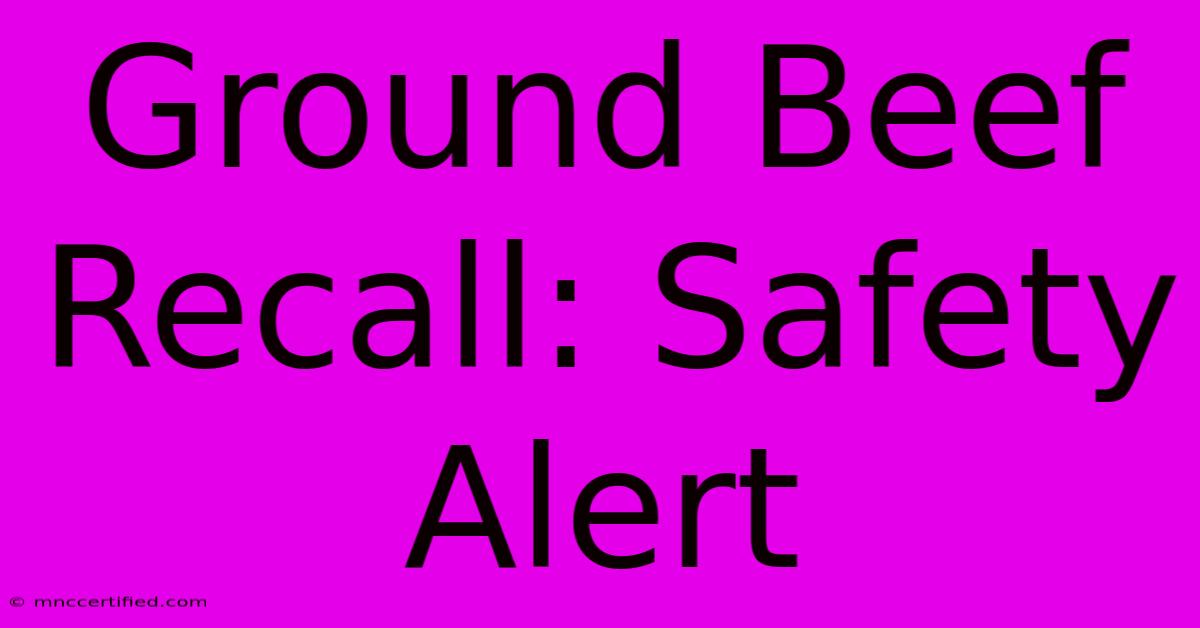Ground Beef Recall: Safety Alert

Table of Contents
Ground Beef Recall: Safety Alert – What You Need to Know
A ground beef recall can be a serious matter, impacting both consumer safety and the reputation of food producers. This comprehensive guide will walk you through everything you need to know about ground beef recalls, from understanding the reasons behind them to how to protect yourself and your family. We'll cover key safety tips, how to identify recalled products, and what actions to take if you've purchased potentially contaminated beef.
Understanding Ground Beef Recalls
Ground beef recalls are issued by the United States Department of Agriculture (USDA) Food Safety and Inspection Service (FSIS) or similar agencies in other countries when there's a reasonable probability that the product is contaminated and poses a health risk to consumers. Several factors can trigger a recall:
Common Causes of Ground Beef Recalls:
-
E. coli contamination: Escherichia coli (E. coli) is a bacteria that can cause severe food poisoning, leading to symptoms like diarrhea, vomiting, and stomach cramps. This is a frequent cause of ground beef recalls. Certain strains, like E. coli O157:H7, are particularly dangerous.
-
Salmonella contamination: Salmonella is another bacterium that can contaminate ground beef, resulting in foodborne illness. Symptoms are similar to E. coli infection, but can also include fever.
-
Listeria contamination: Listeria monocytogenes is a bacterium that can cause listeriosis, a serious infection that's particularly dangerous for pregnant women, newborns, older adults, and people with weakened immune systems.
-
Foreign material contamination: This could include things like bone fragments, plastic pieces, or metal shards that accidentally ended up in the ground beef during processing.
-
Mislabeling: While not a direct health risk, mislabeling can lead to allergic reactions or dietary restrictions being violated. For example, a product mislabeled as "beef" that actually contains other meats could trigger a recall for those with allergies.
How to Identify Recalled Ground Beef
The USDA FSIS utilizes several methods to alert the public about recalled ground beef. Knowing how to identify these alerts is crucial:
-
USDA website: Regularly check the USDA FSIS website for recall announcements. They provide detailed information, including the brand name, product code, establishment number, and any identifying markings on the packaging.
-
Media alerts: Stay informed through news outlets, both online and traditional media. Major recalls are usually widely publicized.
-
Retailer notifications: Check the websites and social media pages of grocery stores where you regularly purchase ground beef. They will often post announcements about recalled products.
-
Check your refrigerator: If you have ground beef, carefully examine the packaging for any recall notices or information that matches descriptions of recalled products. Look for the establishment number, usually found within the USDA inspection mark.
What to Do If You Have Recalled Ground Beef
If you discover you have purchased ground beef that's been recalled, do not consume it. Follow these steps:
-
Discard the product: Properly dispose of the recalled ground beef. Do not attempt to cook or otherwise prepare it.
-
Contact the retailer: If you purchased the ground beef from a retailer, contact them to inform them of the issue and inquire about a refund or replacement.
-
Contact the USDA: You can also contact the USDA FSIS to report the issue. They maintain a detailed database of recalls and can provide further assistance.
-
Monitor your health: If you have already consumed the recalled ground beef and experience symptoms of food poisoning, seek medical attention immediately.
Preventing Ground Beef Contamination: Tips for Safe Handling
Proper handling of ground beef is essential in minimizing the risk of contamination:
-
Cook thoroughly: Ground beef should be cooked to an internal temperature of 160°F (71°C) to kill harmful bacteria. Use a food thermometer to ensure it reaches this temperature.
-
Wash your hands: Always wash your hands thoroughly with soap and water before and after handling raw ground beef.
-
Avoid cross-contamination: Keep raw ground beef separate from other foods to prevent cross-contamination. Use separate cutting boards and utensils.
-
Refrigerate properly: Store ground beef at 40°F (4°C) or lower. Use it within 1-2 days of purchase.
-
Don't refreeze: Avoid refreezing ground beef that has already been thawed.
By understanding the risks, learning how to identify recalled products, and following safe food handling practices, you can significantly reduce your risk of foodborne illness associated with ground beef. Staying informed about food safety alerts is crucial for the well-being of you and your family. Remember to always check the USDA website for the latest recall information.

Thank you for visiting our website wich cover about Ground Beef Recall: Safety Alert. We hope the information provided has been useful to you. Feel free to contact us if you have any questions or need further assistance. See you next time and dont miss to bookmark.
Featured Posts
-
Pete Wicks Tells Jowita To Stop
Nov 22, 2024
-
Browns Upset Steelers On Tnf
Nov 22, 2024
-
Huda Kattans Black Friday Deals
Nov 22, 2024
-
Morgan On Ellens Show Cancellation
Nov 22, 2024
-
Union Security Life Insurance Co
Nov 22, 2024